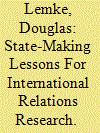|
|
|
Sort Order |
|
|
|
Items / Page
|
|
|
|
|
|
|
| Srl | Item |
| 1 |
ID:
170299


|
|
|
|
|
| Summary/Abstract |
Existing approaches to campaign ethics fail to adequately account for the “arms races” incited by competitive incentives in the absence of effective sanctions for destructive behaviors. By recommending scrupulous devotion to unenforceable norms of honesty, these approaches require ethical candidates either to quit or lose. To better understand the complex dilemmas faced by candidates, therefore, we turn first to the tradition of “adversarial ethics,” which aims to enable ethical participants to compete while preventing the most destructive excesses of competition. As we demonstrate, however, elections present even more difficult challenges than other adversarial contexts, because no centralized regulation is available to halt potential arms races. Turning next to recent scholarship on populism and partisanship, we articulate an alternative framework for campaign ethics, which allows candidates greater room to maneuver in their appeals to democratic populations while nevertheless requiring adherence to norms of social and political pluralism.
|
|
|
|
|
|
|
|
|
|
|
|
|
|
|
|
| 2 |
ID:
170300


|
|
|
|
|
| Summary/Abstract |
The article focuses on the question of how each of us should deliberate internally when forming judgements. That is a matter of political consequence, insofar as those judgements stand behind our votes. I argue that some violations of epistemic independence like message repetition can, if the receivers are not aware of the repetition, lead them to double-count information they have already taken into account, thus distorting their judgments. One upshot is that each of us should ignore or heavily discount certain sorts of inputs (e.g., bot messages or retweets) that are likely just to be repetition of what we have already taken into account in our internal deliberations. I propose various deliberative norms that may protect our internal deliberations from epistemic double-counting, and argue that opinion leaders have special epistemic duties of care to shield their audiences from clone claims.
|
|
|
|
|
|
|
|
|
|
|
|
|
|
|
|
| 3 |
ID:
170303


|
|
|
|
|
| Summary/Abstract |
A key question in the study of minority representation is whether descriptive representatives provide superior substantive representation. Neglected in this literature is the distinction between two forms of substantive representation: rhetoric versus policy. We provide a systematic comparison of presidential minority representation along these two dimensions. Barack Obama was the first African American president, yet his substantive representation of African Americans has not been fully evaluated. Using speech and budget data, we find that relative to comparable presidents, Obama offered weaker rhetorical representation, but stronger policy representation, on race and poverty. While we cannot rule out non-racial explanations, Obama’s policy proposals are consistent with minority representation. His actions also suggest that descriptive representatives may provide relatively better policy representation but worse rhetorical representation, at least when the constituency is a numerical minority. We thus highlight an understudied tension between rhetoric and policy in theories of minority representation.
|
|
|
|
|
|
|
|
|
|
|
|
|
|
|
|
| 4 |
ID:
170304


|
|
|
|
|
| Summary/Abstract |
New scholarship in American politics argues that interest groups should be brought back to the center of the field. We attempt to further that agenda by exploring an aspect of group influence that has been little studied: the role interest groups play on the inside of government as official participants in bureaucratic decision-making. The challenges for research are formidable, but a fuller understanding of group influence in American politics requires that they be taken on. Here we carry out an exploratory analysis that focuses on the bureaucratic boards that govern public pensions. These are governance structures of enormous financial consequence for state governments, public workers, and taxpayers. They also make decisions that are quantitative (and comparable) in nature, and they usually grant official policymaking authority to a key interest group: public employees and their unions. Our analysis suggests that these “interest groups on the inside” do have influence—in ways that weaken effective government. Going forward, scholars should devote greater attention to how insider roles vary across agencies and groups, how groups exercise influence in these ways, how different governance structures shape their policy effects, and what it all means for our understanding of interest groups in American politics.
|
|
|
|
|
|
|
|
|
|
|
|
|
|
|
|
| 5 |
ID:
170302


|
|
|
|
|
| Summary/Abstract |
The 2015 Paris Agreement established a new logic for international climate governance: the pledge-and-review system. In 2009, the same idea had been proposed in the Copenhagen Accord, but was then forcefully rejected by the negotiation community. Explaining this turnaround, I analyze the role of the United States in the international climate negotiations, using Putnam’s two-level game framework and Snidal’s k-group theory. U.S. domestic politics imposed significant constraints on the terms of the Paris Agreement, contributing to the emergence of the new treaty architecture. Until 2015, U.S. negotiators were either unable or unwilling to bring the demands of political actors at the domestic and international levels in alignment. President Obama achieved this alignment in 2015 by creating international support for a treaty without legally binding obligations that could circumvent a Congressional ratification barrier. The latter required a surprising move: the proactive engagement of China despite the structural context of hegemonic transition.
|
|
|
|
|
|
|
|
|
|
|
|
|
|
|
|
| 6 |
ID:
170301


|
|
|
|
|
| Summary/Abstract |
A common complaint about pacifism holds that it is utopian, in a pejorative sense. The worry can take various forms and directions, but when it is couched in terms of just war theory it usually includes accusations of pacifism’s immorality, inconsistency and impracticality. Contemporary defenders of pacifism have responded to this complaint by delineating a highly sophisticated, empirically informed account of pacifism that foregrounds its real-world effectiveness. This article takes a different route to vindicating pacifism via a more nuanced picture of what is specifically utopian about it. I propose that peace, in at least some of its guises, can be described as a minor, grounded utopia; it is a desire for an alternative future without war and violence, whose pursuit blurs the boundaries between thought and action. Reconstructing both prefiguration and testimony as practical modes of this kind of pacifism, I maintain that minor, grounded utopias are sites rife with conflict and contestation.
|
|
|
|
|
|
|
|
|
|
|
|
|
|
|
|
| 7 |
ID:
170297


|
|
|
| 8 |
ID:
170298


|
|
|
|
|
| Summary/Abstract |
After a fatal police shooting, it is typical for city and police officials to view the family of the deceased through the lens of the law. If the family files a lawsuit, the city and police department consider it their legal right to defend themselves and to treat the plaintiffs as adversaries. However, reparations and the concept of “reparative justice” allow authorities to frame police killings in moral rather than legal terms. When a police officer kills a person who was not liable to this outcome, officials should offer monetary reparations, an apology, and other redress measures to the victim’s family. To make this argument, the article presents a philosophical account of non-liability hailing from self-defense theory that centers on the distinction between reasonableness and liability. Reparations provide a nonadversarial alternative to civil litigation after a non-liable person has been killed by a police officer. In cases where the officer nevertheless acted reasonably, “institutional agent-regret” rather than moral responsibility grounds the argument for reparations. Throughout the article, it is argued that there are distinct racial wrongs both when police kill a non-liable black person and when family members of a black victim are treated poorly by officials in the civil litigation process.
|
|
|
|
|
|
|
|
|
|
|
|
|
|
|
|
| 9 |
ID:
170306


|
|
|
|
|
| Summary/Abstract |
Many of the central concerns of international relations—war, diplomatic relations, international trade and investment, and alliance politics—are also central to the state-making processes that are essential for the survival of states. The overlap between international relations and state making is profound but largely unrecognized. I present a framework emphasizing connections across these currently disparate areas of scholarship, thereby providing a more comprehensive basis for IR research. The framework I advance emphasizes the pursuit of capacity and legitimacy throughout a state’s existence, suggests new research topics, and raises new concerns about research design.
|
|
|
|
|
|
|
|
|
|
|
|
|
|
|
|
| 10 |
ID:
170305


|
|
|
|
|
| Summary/Abstract |
It goes without saying that “leaders rule.” And it stands to reason that the background characteristics of leaders affect the way they rule. Who are the leaders of the world? We generate a composite portrait of the global political elite with data from the Global Leadership Project (GLP), the first dataset offering biographical information on a wide array of leaders in most countries of the world. We offer comparisons across office, regions, regime types, and level of development. And we enlist the variables in the dataset in a latent class model to arrive at an empirical typology of political leaders around the world.
|
|
|
|
|
|
|
|
|
|
|
|
|
|
|
|
|
|
|
|
|